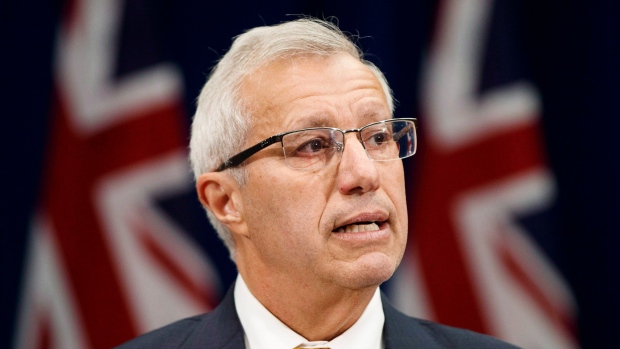Nov 15, 2018
Ontario sharpens axe as it readies plan to cut mounting deficit
, Bloomberg News

Investors will be watching for hints as how Ontario plans to start tackling the world’s largest largest pile of sub-sovereign debt when the Canadian province gives a snapshot of its finances on Thursday.
Finance Minister Victor Fedeli will unveil the new government’s economic and fiscal outlook in the provincial legislature starting at about 1:15 p.m. While not an official budget, the document will outline the government’s initial assessment of a province that’s growing moderately while steadily racking up debt.
Ontario’s deficit is poised to reach about $15 billion in the fiscal year ending March 31, more than double the previous government’s forecast, while net debt stands at about $338 billion, the highest of any sub-sovereign borrower rated by Moody’s Investors Service.
“Given that the new government stands for good management, I would expect them to address the deficit as a priority,” Robert Hogue, senior economist at Royal Bank of Canada, said in a telephone interview. “I would expect a significant reduction of the deficit fairly early in its mandate.”
Premier Doug Ford has committed to balancing the books over time and has already begun to rein in spending, scrapping a pilot basic income program and capping social assistance. Together with other measures, that could save C$2 billion this year, according to report from Toronto-Dominion Bank last week. Allowing other programs to lapse could save another $1 billion while freezing a minimum wage hike may support employment and boost revenues, the bank said.
Rising Rates
But the Progressive Conservative government, which swept to power in June, also made some costly campaign pledges which could push the budget shortfall to as high as $18.7 billion in 2019-20, according to TD. Those promises included a cut to corporate and personal income taxes and reduction in the gas tax.
“How this is going to line up with the campaign promise to balance is going to be interesting,” said Joey Mack, Toronto-based director of fixed income at GMP Securities LP. “But given all the announcements pointing to huge deficits, I don’t think we will get too much reaction” if the deficit stays below C$18 billion, he said.
Ontario is expected to grow at about 2 per cent this year and 1.9 per cent next year according economists’ forecasts compiled by Bloomberg.
Ontario bonds have declined 1.5 per cent this year, trailing the 1.3 per cent drop for Quebec and 1.1 per cent for the Bank of America/Merrill Lynch bond index of provincial borrowers. Investors in Ontario’s 2.9 per cent bonds due 20128 demand about 67 basis points over similar duration federal Canada debt, according to bid prices in Bloomberg.
While risk premiums aren’t a source of big concern, the absolute yields are rising as the Bank of Canada and other central banks around the world increase interest rates to cool inflationary pressures. Since the end of June, when Ford took office, the yield investors demand to hold province’s debt maturing between three months and five years have increased between 40 and 50 basis points, Bloomberg data show.
“An interest rate increase of 25 basis points will cost Ontario taxpayers an additional $100 million a year in interest payments,” Fedeli wrote in a Nov. 1 opinion column for the Toronto Sun. “For the government of Ontario, interest rate increases pose a significant challenge.”
